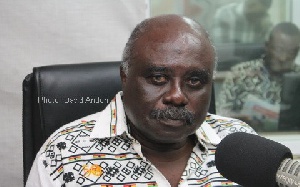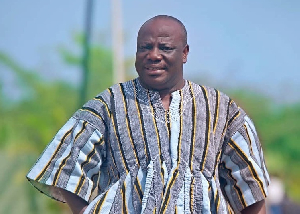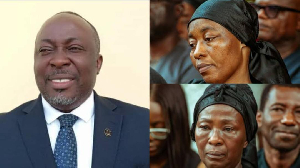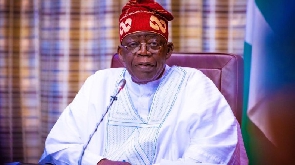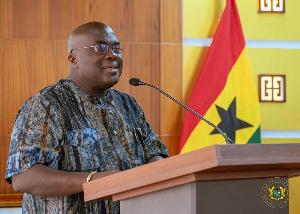Preamble
In 1995, Ied NPP/CPP task force that took part in the first voters’ registration exercise of the 4th Republic. 21 years on, it’s unreal that the issue of foreigners is still at the centre of so much rancor.
If we thought that setting the dates for the registration exercise was the end of our woes, we misfired badly. For it appears that pushing things into the month of October, the end of which coincides with the celebration of 'Halloween', is introducing a whole new dimension into the small business of empowering Ghanaians to decide who should take this country into the 21st century.
As so often happens to the inhabitants of this haven of peace and tranquility, we can turn the most mundane and obvious things into very complex hypotheses. So it is that instead of us concentrating our energies to get all Ghanaians to register to vote, everybody has become obsessed with ferreting out non-Ghanaians, who for reasons that still baffle me, we call 'Aliens', and not 'foreigners'.
All manner of people who have nothing to do with the voter registration exercise are making pronouncements on the subject. Almost invariably, most of the comments only add to the confusion rather than assist the Electoral Commission's work.
The President has pronounced on the matter and conferred with delegations of chiefs who have ‘gone’ to him for counselling.
Some chiefs who feel they are not confused have also pronounced on the subject. Political party activists have had their say, as have all manner of 'do-gooding' publicly-funded organizations who have only realized that they are to inform the citizenry of their rights and civic responsibilities.
Even political rags are disguising mischief in the glove of news worthy civic duties. Rather than clear the matter, most of the interventions have only managed to confuse the whole business even more.
The right to register to vote is enshrined in Article 42 of our Constitution which states:"Every citizen of Ghana of eighteen years of age or above and of sound mind has the right to vote and is entitled to be registered as a voter for the purposes of public elections and referenda”
The key qualifications are citizenship, age and soundness of mind. The fun and games begin when people try to define what qualifies one to be a Ghanaian and how do we verify this fact.
The Constitution gives very clear and unambiguous definitions of citizenship.
Articles 6 & 7 of the Constitution define who can call themselves a Ghanaian citizen. The easiest and most incontrovertible cases are that anyone who was a citizen when the Constitution came into force on 7 January 93 continues to be a citizen (Art. 6(1).
For the purposes of the forthcoming registration exercise, the other important class to note is anybody over the age of 18 and of sound mind who has taken the necessary steps to acquire Ghanaian citizenship by registration since 7 January 1993, according to the requirements of Art. 7.
However, the problem comes up when it comes to verification. For in the absence of proper documentary evidence such as a national identity card, it is well-nigh impossible to resolve the matter of who is or is not a 'foreigner' living in Ghana.
Let's start from the first principle. I had always assumed that anybody who is born in Ghana automatically qualifies to be a citizen of Ghana. But it turns out that this is not the case at all. If they were not already recognised as citizens when this constitution came into force, they can become so if either of their parents or grandparents were citizens of Ghana. Now this is where the real problems begin when dealing with who is an alien in our midst and must, therefore, mind his own business when it comes to registering to vote.
There are several people born outside of the borders that define the modern state of Ghana who have lived here for many years and some even decades. If they have gone through a formal process of taking up citizenship of Ghana, then they are citizens of Ghana and are entitled to register to vote. But what of their children who may have been born in Ghana and are over the age of 18? In the absence of birth conferring an automatic right of citizenship, I am not so sure that they are covered by Art. 42 unless they themselves have gone through a formal process of naturalization. The reality is that most people in this category are largely illiterate, often live in rural areas and hardly have a need to travel outside our borders and thus obtain a passport, the most formal and definitive recognition of citizenship in the absence of a national ID card.
The confusion about establishing the right to register of so called aliens is compounded by the absence of any requirement to provide proof of citizenship and age. Again, we have sought shelter in the increasingly absurd excuse that we do not keep proper records of births and deaths.
So it is that anybody can turn up, claim to be a Ghanaian, of 18 years or above, and of sound mind, and demand to be registered to vote as of right. The onus is then on the party agents to challenge their claim of qualification and eligibility.
The farce begins when both the prospective voter and the challenger(s) have different interpretations of citizenship and there is no incontrovertible evidence available to settle the dispute. The present regulation says that the person should be allowed to register under formal protest, with verification to be decided at a future date. So he or she will be entitled to try to register. However, the challenger may also be very determined to stop them on the basis that once they register, nothing can undo. Both sides may be asserting rights which are probably not well-informed by the laws of the land or the regulations governing the registration exercise.
For the moment, let's try to bring sanity into the whole process by suggesting that: 1) anyone who knows they were not born in Ghana and have not taken the necessary steps to take up Ghanaian citizenship should not attempt to register:;2)Anybody born in Ghana must be assumed to be a citizen unless they have taken legal steps to renounce their citizenship; 3)Anybody who is in doubt about their eligibility or feels they are likely to be challenged must try to take some documentary evidence of eligibility with them to their registration centre; 4) Political party agents must accept and operate by the Electoral Commission's rule that anybody suspected of being an alien must be allowed to register whilst a formal protest is launched and the matter investigated.
The registration of voters is too important an exercise for this country's future for it to be allowed to degenerate into a squabble about terrestrial aliens living in our midst. In this regard, nobody should ever appear to be offering advice that people who are clearly foreigners in our midst can and should be allowed to register, on account of some spurious sentiment of oneness of people divided by colonially-created boundaries. For the moment, these boundaries the legitimate definition of the nation state of Ghana, which give credence and authority for the same person to call themselves the elected President.
Ultimately, the lesson for us to learn is our refusal to do proper documentation of who is or is not a Ghanaian will always catch up with us in unexpected but inevitable dire consequences. The case for a national ID card becomes more and more compelling each day, photo, thumb print and all. . If we had them, all we would have had to do would have been to turn up at the registration centres, flash them at the electoral officers and bingo they will become empowered for Decision '96.
Opinions of Saturday, 7 May 2016
Columnist: Dr. Charles Wereko-Brobby

